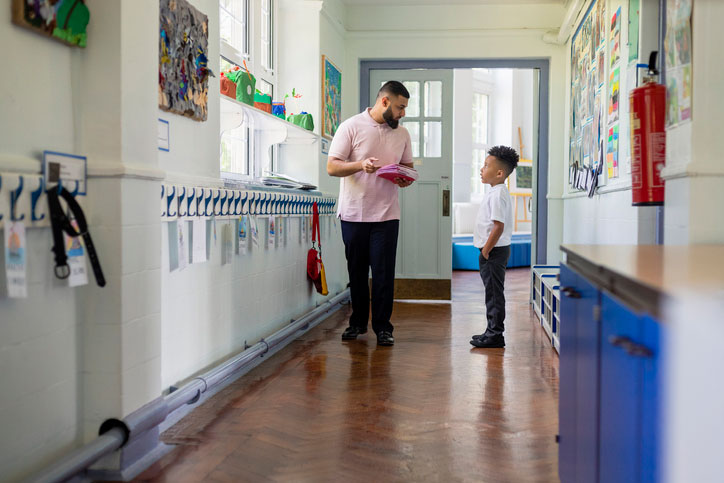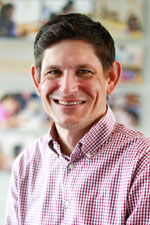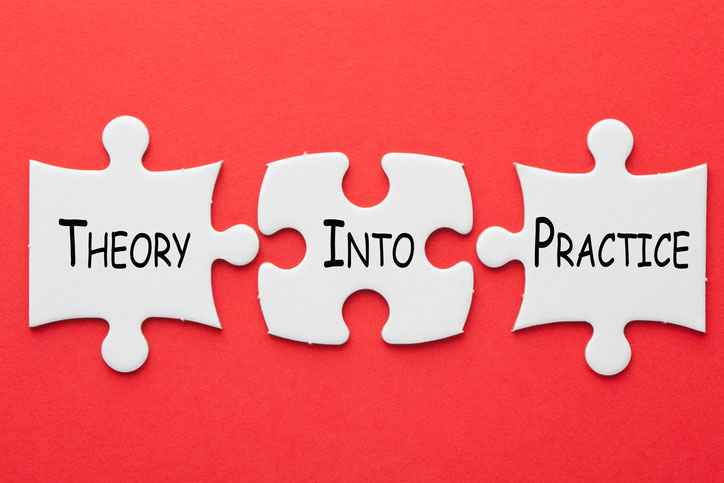
Imagine you’re already studying to become a school counselor. Your professors are everything you hope to be one day: compassionate, knowledgeable, and impressively experienced. With each class, you become more and more confident that you are equipped for the school counseling field. . But one day, you start to feel a little shaky.
- Top Picks
Featured Universities with School Counseling Programs
#1
Walden University
MS in School Counseling - General Program. Click here to contact Walden University and request information about their programs.
#2
Grand Canyon University
M. Ed in School Counseling (leads to initial Licensure) Click here to contact Grand Canyon University and request information about their programs.
#3
New York University (NYU)
NYU Steinhardt's accredited master of arts program in Counseling and Guidance: School and Bilingual School Counseling. Through this online program, you will gain the skills you need to become a professional Pre-K-12 school counselor, working with children and families in your community to foster academic achievement and success. Click here to contact New York University and request information about their programs.
#4
University of Denver
Earn a Master's degree in School Counseling online from the University of Denver. Learn from doctoral-level faculty in live classes and gain experience through mock counseling and in-field training. No GRE required. Click here to contact University of Denver and request information about their programs.
#5
Campbellsville University
Online Master of Arts in Education in School Counseling Click here to contact Campbellsville University and request information about their programs.
You realize it started when your class discussed how counselors handle teen pregnancy. You did the reading and absorbed the material, asked great questions, and received informative responses from your instructor . But as you went about your day, you started to dwell on worst-case scenarios. What if you encourage a student to discuss the situation with their parents and it goes horribly wrong? What if you freeze up and your student thinks you can’t help her What if all your knowledge means nothing when faced with a scared, desperate teenager who has no one else to turn to?
These moments of panic aren’t uncommon among counseling students. However, by the time you graduate, you’ll have had real experiences with situations like that above and many hours in the field to help put your anxieties to rest. Professor Nick Abel, a seasoned counselor and educator in Butler University’s School Counseling program, has seen countless students come into their own during their internship.
In an interview with School-Counselor.org, Professor Abel discussed a few reasons why internships are so vital to career readiness. If you’re nervous about entering the often unpredictable field of school counseling, let his insights steel your resolve:
“I worked for two years as an elementary school counselor and then as a high school counselor. Partway through my career, I began taking internship students from local universities and I really enjoyed working with them. I just loved watching their growth over the course of the semester or the year that they were with me.”

After earning his Master’s in Counseling and Guidance in 2004, Professor Nick Abel worked as an elementary and high school counselor for eight years. But as he helped students navigate life in every way, he also trained his colleagues in helping their students plan for post-secondary success. In 2013, he earned his Doctor of Education in Counselor Education and Supervision and joined Butler University’s College of Education faculty. Today, Professor Abel can be found teaching a new generation of school counselors, supervising their internships, and helping his Butler colleagues develop new courses that keep the program up-to-date within a constantly evolving field.
Fieldwork Transforms Theories into Skills
About halfway through the program, many of Professor Abel’s students begin learning advanced, evidence-based counseling techniques. Around the same time, they also apply that knowledge during a 100-hour practicum experience:
“Extensive field experiences start pretty early in the program. There’s a lot of time spent in schools, under the supervision of school counselors [and] interactions with school counselors, work in the community, a service component. We really want people to feel like they have been doing this job for a long time in the program.”

The melding of learning in the classroom and application of those learning points is paramount for students to feel confident and competent. Say you just completed a learning module about childhood grief reactions. At the school where you’re completing your practicum, one of the students just lost a grandparent and is experiencing distress about attending the funeral service. You have the privilege of observing your supervising counselor skillfully validate the child’s feelings while teaching them to successfully process and cope with strong emotions.
Suddenly, everything you learned in class becomes real, and you begin to feel confident that when a similar situation arises with a student you’re working with directly, you could use that experience to inform your own actions. As the pattern of learning and practice repeats, you solidify concepts, practice skills, develop a toolkit, and build confidence and competence along the way.
What Skills Do School Counselors Practice During Fieldwork?
Though different programs offer different specialties, programs like Butler University’s follow curriculum guidelines set forth by the Council for the Accreditation of Counseling and Related Educational Programs (CACREP). This is the organization responsible for setting education standards for counselors of all kinds.
In programs like these, you’ll practice:
- Professional self-awareness.
- Serving diverse groups of students and advocating for social justice, specifically diversity, equity, and inclusion in the counseling field
- Individual and group counseling concepts and techniques
- Parent, guardian, and family involvement.
- Assessing challenges to students’ social, academic, and career wellbeing.
- Working collaboratively with teachers, administrators, and other staff.
- Referring students and families to mental health professionals and other services that meet their specific needs.
Along with these best-practices, you may also have to demonstrate your ability to use techniques like active listening, goal setting, and crisis intervention.
Students Can Start Forming Their Own Professional Identities
After completing a practicum and demonstrating an advanced understanding of school counseling theory, Butler students can start working towards their 600-hour internship requirement. At this stage, students still have supervisors and advisors, but they often operate independently. While this gives students another chance to practice their skills, Professor Abel says he and his colleagues have another goal in mind, as well:
“We want students to feel like, ‘I’ve been doing this job for a lot of my time in the program.’”
Think about it like this — excluding vacations and time off, there are just over 2,080 working hours in a year. That makes 700 hours of fieldwork equivalent to more than four months of full-time employment. That’s four months to identify and improve upon your weaknesses, build your strengths, and learn to see yourself as a competent professional all while being highly supported by faculty and school-based professionals. When it comes time to look for jobs, you know what you bring to the table. If self-doubt makes you second-guess your abilities, you can say confidently, “I can do this, I’ve already done this, I’m experienced enough to handle it, and I know when to consult and get supervision.”
Do I Get to Choose My Internship?
Whether you pursue your school counseling Master’s degree online or on-campus, you’ll need to complete your internship in school setting like an elementary, middle, high, or K-12 school. In an online program, that means finding a school in your local area. Sometimes, a program will have existing partnerships near you, but other times you’ll be asked to help identify possibilities. Either way, internship placements must be approved by your faculty advisor. At Butler, there is considerable support throughout the placement process, and both faculty and support staff will work to ensure that the qualifications of your supervisor, school support systems, and experiences you are likely to encounter will prepare you for the field.
If you feel passionate about helping certain student populations, your faculty advisor can help you find the perfect fit. This might include schools located in specific settings such as urban or rural communities, or those with large populations of immigrants, refugees, underserved or marginalized populations, or special needs students You may even have the chance to complete your internship at multiple sites to expand your experience.
Internships Help Students Gain Perspective and Practice Self-care
Gaining firsthand experience is valuable enough, but throughout your internship, you’ll also learn from the experiences of your peers, advisors, and new colleagues through group supervision. Butler’s school counseling students completing their practicum and internships meet weekly to discuss what they encountered the previous week and receive support and suggestions. Whether an encounter challenges you professionally or emotionally, your peers and instructor can give you the feedback, perspective, and support you need to improve and keep moving.

In this open environment, students also get their first exposure to professional self-care. At the American Counseling Association’s (ACA) 2019 conference, attendees suggested self-care strategies many students are already familiar with like exercising, doing hobbies, and taking a well-deserved break.
However, they also talked about some heavier-duty strategies like setting boundaries and developing burnout prevention skills. This might include only checking emails during worktime (not on weekends) or creating a daily ritual to leave work at work. Setting boundaries and maintaining work/life balance can be difficult for new counselors so practice and discussion is critical.
Self-care Is About More Than the Individual
Practicing regular self-care is a great way for anyone to maintain their mental health. But for school counselors, it’s also an ethical obligation.
In their Ethical Standards, the American School Counselor Association (ASCA) states that professionals must, “recognize the high standard of care a professional in this critical position of trust must maintain” and take the steps required to do so. Caring for yourself enables you to care for others; Remember, self-care is “me also” not “me first.”
Real-world Experience Underlines the Importance of Humility and Adaptability
Though many of the professionals you encounter will seemingly have all the answers, they’ll be the first to admit that they don’t. Despite having a long, successful career himself, Professor Abel maintains a certain level of humility when speaking about his work:
“My ultimate goal is for students to all leave and be far better school counselors than I was.”
This attitude is crucial in a field where researchers estimate about 70% of professionals experience burnout. Because along with being a psychologically-taxing job, school counseling is always changing. America’s ever-shifting demographics mean counselors will have to adapt to the unique challenges faced by new groups of marginalized students. And as mental health issues among kids continue to worsen in the wake of the Covid-19 pandemic, counselors are encouraged to have a mindset of lifelong learning and remaining curious
As you complete your internship, remember that no counselor before or after you had or will have a perfect record. There will be mistakes and missteps, as well as things you wish you could do over. But as Professor Abel points out, as long as school counselors learn from their shortcomings, adapt, and teach the next generation to do the same, there’s always hope for a better future — for students, counselors, and society as a whole.